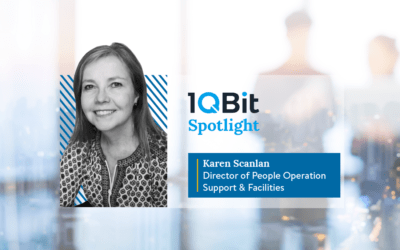Pooja Pandey works to solve the world’s most challenging optimization problems in energy, finance, and health care, using the power of advanced and quantum computing.
“At this stage, it is tough to predict the future of quantum computing. … The noisy, intermediate-scale quantum era computers of today do not have enough qubits. Every great invention takes time, and many researchers are working towards making quantum computing practically useful, but there is still a long way to go.”
—Pooja Pandey
Before starting at 1QBit, she obtained her Master of Science degree in Mathematics from the University of New Brunswick and her PhD. in Operations Research from Simon Fraser University.
When Pooja is not solving optimization problems, she spends her free time with her family or seasonal vegetable gardening in her backyard.
We sat down with Pooja to explore how she learned about 1QBit, what she is currently working on, and what she believes is the future of quantum computing.
How did you end up at 1QBit?
While completing my PhD., I decided to venture out and look for a job. I came across an opening at 1QBit for the position of Operations Research Scientist, and, after reading the job description, I knew it was the perfect fit for me. As I did more research on the position, I realized that a fellow graduate student of mine worked at 1QBit. After talking with him and learning more about 1QBit and the position, I decided to apply. After the hiring process was over, I landed the job!
What are you currently working on?
Currently, I am working on a project where I need to find real-world applications of optimization problems. This is so that we can design efficient algorithms so these problems can be solved on a new type of quantum computer called a coherent Ising machine (CIM), which uses continuous variables to solve problems.
What question or challenge were you setting out to address when you started this work?
When I started this work, the main challenge was in how to transform a given problem into an equivalent problem that can be solved using new types of quantum hardware. Apart from this challenge, one needs to learn the capabilities of each type of hardware.

Pooja visiting Vancouver Island
What excites you about your work?
In previous projects, I was working with a gate model quantum computer and a quantum annealer. Now, I am working with a CIM. Quantum effects inspire all three types of hardware, and these can reduce the computation time needed to solve a problem compared to the time needed by our everyday computers. The most exciting part of my work is that I am one of the very few people who get the chance to explore optimization problems that can be solved using this hardware. Another exciting part of my work is that I get the opportunity to work with many talented individuals who come from different research backgrounds.
Do you have an analogy to help us understand your work?
Imagine the following. To reach a destination, there is a special road that has certain features, like the maximum weight that a vehicle can be. So, not all kinds of vehicles can be used to travel on this road, for example, heavy trucks. We need to find a vehicle that is compatible with the limitations of this road. In my work, the hardware we use is like the road, and I am looking for an algorithm (a light vehicle, like a standard car) that can travel on this road.
Why is your research important? What are the possible real-world applications?
My primary field of research is operations research. In this field, for a given problem, one tries to find the best solution among all possible solutions. If finding the best solution to a problem is very challenging, one tries to find a reasonable solution using intelligently crafted algorithms (techniques). The real-world applications of operations research are unlimited. Some of these applications are in oil and gas refinery, the health care sector, finance, the airline industry, drug discovery, machine learning, and integrated circuit design.
What kind of response has your research received?
Quantum hardware has not yet developed to the point where it can solve real-world problems at a scale relevant to industry. The benchmarking results obtained from my computational experiments have helped the team to understand the quality of the solutions produced by the types of quantum hardware we have used. These results will help the team further understand the work required to improve the hardware.
What are the next steps for this work?
The next step for this work is to develop intelligently crafted algorithms to solve real-life applications of optimization problems with the help of current CIMs.
What is the future of quantum computing?
At this stage, it is tough to predict the future of quantum computing. Since the field is in its infancy, there are several roadblocks on the way to developing a full-scale useful quantum computing device that can solve significant real-world problems. The noisy, intermediate-scale quantum (NISQ) era computers of today do not have enough qubits. Every great invention takes time, and many researchers are working towards making quantum computing practically useful, but there is still a long way to go.
Thank you for sharing your story with us, Pooja. It was a pleasure learning about your research and your thoughts on quantum computing.
To learn more about 1QBit, please subscribe to our monthly newsletter.




